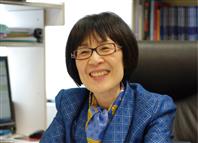Why were you interested in psychology?
When I was in primary school, I liked to observe people’s behaviour, wondering what they thought, what they felt and why they had such reactions. Psychology is a scientific field that systematically investigates human behaviour. I was interested in it and learned that American high schools had psychology courses. That’s why I went to the US before I finished my secondary school education in Hong Kong.
Why did you choose to leave the University to serve as the founding chairperson of the Equal Opportunities Commission (EOC) from 1996 to 1999?
I was the Dean of Social Science at that time. I did hesitate over leaving that position. I had been advancing women’s rights. But not many people knew that I had also been active in promoting the services for and the rights of people with disabilities, especially those of ex-mentally ill persons. At that time the EOC was set up to implement the Sex Discrimination Ordinance and the Disability Discrimination Ordinance. I felt obligated to help with the implementation of these two ordinances at a nascent stage. So I decided to take leave from my academic career. I think it was worth it.
CUHK has many female professors. But we don’t have many women in senior management. What do you think of this?
CUHK is no different from other corporations in Hong Kong, in which women leaders are rare. Why? You have to put it in its historical context. It is a long process of social change that involves education, especially higher education, for women, their career advancement, and their ascension to senior positions. In Hong Kong, it was not until the late 1970s that the majority of women began to receive proper education after the introduction of nine-year compulsory education. By the early 1990s, with the expansion of higher education, the numbers of female university students began to increase. By around 2000, their numbers began to exceed those of male students. When I first joined CUHK, I could count on two hands the number of female teachers on campus. Now you can see that there have been more and more women in middle management of their professions. Social change takes time. But it’s also important that we have sensitive support and systems for mentoring women leaders.
Is it inevitable that women can only achieve success in their careers at the expense of their families?
Now the gender division of labour is still very traditional—the role of family caregiver is chiefly played by women. The dichotomy between career and family is still perceived to be true by many in our society and many young women think that they’re mutually exclusive. My book Women at the Top is a study of outstanding women leaders. Instead of foregoing a happy family for a successful career, they combine work and family life. To achieve this, you have to set priorities, adopt innovative strategies, make good use of time, and enlist support of social resources. Of course, spousal cooperation is very important. Many successful women leaders are grateful to their husbands for embracing gender equality.
What is your Cross-cultural (Chinese) Personality Assessment Inventory (CPAI) meant for?
In psychology, we often use certain scientifically-based assessment tools to evaluate, analyse or describe a person’s personality and categorize them. Personality assessment tools are not only useful for diagnosis and treatment in clinical practice, they can also be used in the organizational context to recruit, train and promote employees, or to help employees get a better understanding of themselves in their career development. In the past, many of these tools originated in the West. When I returned to Hong Kong, I translated the famous Minnesota Multiphasic Personality Inventory (MMPI) and worked in collaboration with the Institute of Psychology of the Chinese Academy of Sciences to standardize the Chinese version of the MMPI. After that we thought: why don’t we develop a personality assessment that is culturally relevant to the Chinese society? That’s why we developed the CPAI by combining scientific assessment methods of psychology and personality traits of Chinese.
In our study we found that certain personality traits are universal across cultures. But there is a dimension that had been neglected by Western assessment tools—interpersonal relatedness. Western psychology is more individualistic in nature while the Chinese personality is characterized by elements of the interpersonal dimension, such as harmony, relationship orientation, which are not highlighted in Western assessment tools. The cross-cultural studies relating to the CPAI show that these elements are not only specific to Chinese culture, but also relevant to other cultures characterized by collectivism.
You’ve been selected as the co-recipient of the American Psychological Association 2012 Award for Distinguished Contributions to the International Advancement of Psychology. How do you feel about it?
I hope that it would help international psychologists to better understand the notions underlying my work and the relevance of cultures, including Chinese culture, to psychology. Our department is committed to promoting a distinctive Chinese voice in psychology. The Chinese make up one-fifth of the world’s population. The cultural experience of the Chinese and Chinese psychology should have a bigger influence on mainstream psychology. 


































































































































































Social Bookmarks